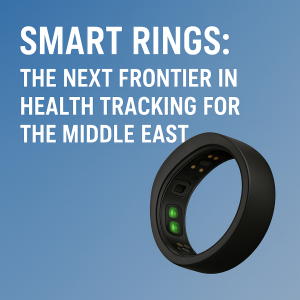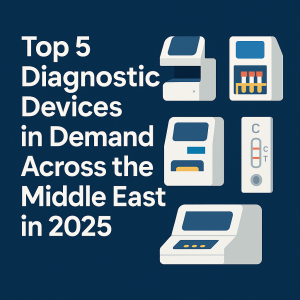Smart Rings: The Next Frontier in Health Tracking for the Middle East
Discover how smart rings are revolutionizing health tracking across the Middle East and creating new opportunities for wearable tech distributors.
 Smart Rings: The Next Frontier in Health Tracking for the Middle East
Smart Rings: The Next Frontier in Health Tracking for the Middle East
In 2025, the landscape of healthcare in the Middle East is rapidly evolving. From AI-driven hospitals to telemedicine, digital innovation is pushing boundaries. One of the most exciting developments in this revolution is the emergence of smart rings—sleek, compact devices that bring wearable health monitoring to the next level.
What Are Smart Rings?
Smart rings are wearable devices designed to track health metrics like heart rate, oxygen saturation, sleep patterns, temperature, and activity levels. Unlike smartwatches or fitness bands, they are small, discreet, and fashionable—making them appealing to users who value convenience and style.
Brands like Oura Ring, Circular Ring, and the upcoming Samsung Galaxy Ring are leading this charge. These rings use advanced sensors and Bluetooth connectivity to provide continuous health data, integrating with mobile apps for real-time insights.
Why Smart Rings Are Trending in the Middle East
Several factors contribute to the rising popularity of smart rings in countries like the UAE, Saudi Arabia, and Qatar:
- Digital Health Initiatives: Governments across the region are investing heavily in smart healthcare, encouraging the adoption of digital tools for preventative care.
- High Smartphone Penetration: With one of the highest smartphone usage rates in the world, Middle Eastern consumers are well-positioned to use connected health wearables.
- Fitness and Wellness Trends: A growing culture of fitness, driven by social media and high disposable incomes, is fueling demand for stylish health trackers.
- Climate Adaptation: In hot climates, bulky devices can be uncomfortable. Smart rings offer a lighter, sweat-resistant alternative.
Use Cases in the Healthcare Industry
Smart rings are not just for consumers—they’re proving useful in clinical and corporate settings:
- Remote Patient Monitoring: Doctors can monitor vital signs of patients with chronic conditions without hospital visits.
- Employee Wellness Programs: Companies can offer smart rings as part of corporate health packages to promote productivity and reduce sick days.
- Hospital Integration: Data collected from rings can be linked to electronic health records, helping doctors make more informed decisions.
How Smart Rings Complement Traditional Diagnostic Devices
While smart rings are primarily for ongoing health tracking, they open new doors for diagnostic companies. For instance, smart rings can flag anomalies like irregular heart rate or sudden drops in blood oxygen. These alerts can trigger the use of biochemistry analyzers, hematology analyzers, or rapid test kits for in-depth diagnostics.
This synergy between wearable tech and lab-grade diagnostics enhances early detection and intervention—a critical advantage in modern medicine.
Opportunities for Distributors and Retailers
For businesses across the Middle East, smart rings represent a booming market:
- Retail Distribution: Pharmacies, electronics stores, and wellness clinics can offer smart rings as part of their product range.
- Private Labeling: Distributors can collaborate with OEM smart ring manufacturers for custom-branded solutions.
- Cross-Selling Potential: Combine smart rings with diagnostic tools like glucose meters or COVID-19 rapid test kits to create health tech bundles.
- Market Differentiation: As one of the earliest adopters in your region, you’ll gain a competitive edge by leading this trend.
Final Thoughts: A Health Tech Revolution in the Making
The smart ring market is at a tipping point, and the Middle East is ready to embrace it. For distributors, retailers, and healthcare providers, now is the time to tap into this trend.
Want to explore more digital health devices or diagnostic technologies that complement this wave of innovation? Visit www.xinrea.com to discover cutting-edge solutions like fully automated biochemistry analyzers, nucleic acid extractors, and rapid diagnostic kits.

 Introduction: Rising Demand for Diagnostics in the Middle East
Introduction: Rising Demand for Diagnostics in the Middle East